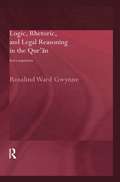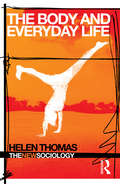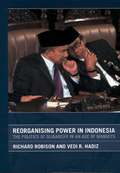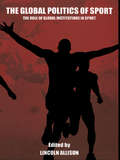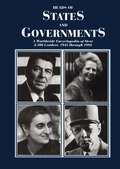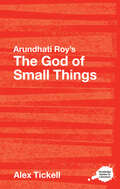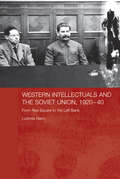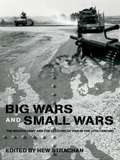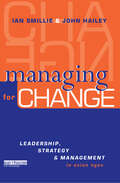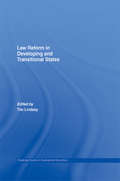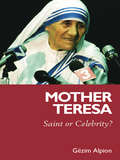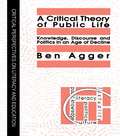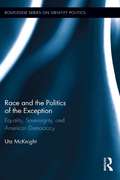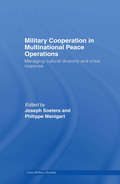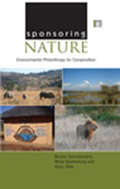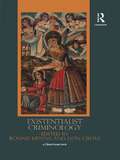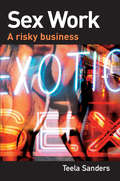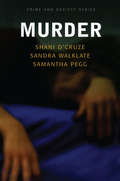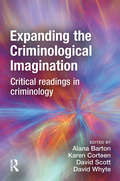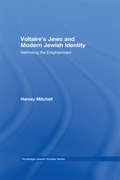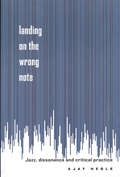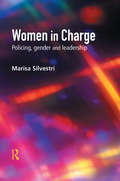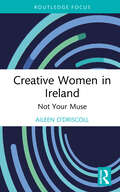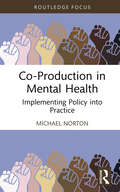Special Collections
Benetech’s Global Certified Accessible Titles
Description: Benetech’s GCA program is the first independent third-party EPUB certification to verify ebook accessibility. By creating content that is born accessible, publishers can meet the needs of all readers. Learn more: https://bornaccessible.benetech.org/
- Table View
- List View
Logic, Rhetoric and Legal Reasoning in the Qur'an
by Rosalind Ward GwynneMuslims have always used verses from the Qur'an to support opinions on law, theology, or life in general, but almost no attention has been paid to how the Qur'an presents its own precepts as conclusions proceeding from reasoned arguments. Whether it is a question of God's powers of creation, the rationale for his acts, or how people are to think clearly about their lives and fates, Muslims have so internalized Qur'anic patterns of reasoning that many will assert that the Qur'an appeals first of all to the human powers of intellect. This book provides a new key to both the Qur'an and Islamic intellectual history. Examining Qur'anic argument by form and not content helps readers to discover the significance of passages often ignored by the scholar who compares texts and the believer who focuses upon commandments, as it allows scholars of Qur'anic exegesis, Islamic theology, philosophy, and law to tie their findings in yet another way to the text that Muslims consider the speech of God.
The Body and Everyday Life
by Helen ThomasIn recent years, there has been an explosion of interest in the contemporary social study of the body which has raised important theoretical and methodological questions regarding traditional social and cultural analysis. It has also generated corporeal theories that highlight the fluid, shifting, yet situated character of the body in society. In turn, these corporeal theories have implications for social relations in an era of new technologies and global market economies. The Body and Everyday Life offers a lively and comprehensive introduction to the study of the body. It uses case studies in performance practices to examine the key concepts, methods and critical insights gained from this area. It includes sections on: ethnographies of the body bodies of performance performing gender the ageing performing body. This book clearly illustrates the complex relationships that exist between the body, society and everyday life, and considers the negative and positive implications for the development of future socio-cultural analysis in the field. It will be an invaluable introduction for students of sociology, body studies, gender studies, dance and performance, and cultural studies.
Reorganising Power in Indonesia
by Vedi Hadiz and Richard RobisonReorganising Power in Indonesia is a new and distinctive analysis of the dramatic fall of Soeharto, the last of the great Cold War capitalist dictators, and of the struggles that reshape power and wealth in Indonesia. The dramatic events of the past two decades are understood essentially in terms of the rise of a complex politico-business oligarchy and the ongoing reorganisation of its power through successive crises, colonising and expropriating new political and market institutions. With the collapse of authoritarian rule, the authors propose that the way was left open for this oligarchy to reconstitute its power within society and the institutions of newly democratic Indonesia.
The Global Politics of Sport
by Lincoln AllisonSport presents one of the most advanced cases of 'globalisation,' arguably because there are fewer cultural and political obstacles to the development of trade and international power in sport than there are in other fields. Thus there has been a change in the nature of the politics of sport since the end of the Cold War; the subject must be rewritten to acknowledge a twenty-first century world in which international sporting organisations and transnational corporations have become far more important than states.The Global Politics of Sport presents a range of essays examining the emerging global political issues in twenty-first century sport including: · The role, and power of organisations such as FIFA and the IOC· The influence of US exceptionalism · The construction of global sports heroes· Tensions developing within traditionally 'alternative' sports in a global commercial cultureThe Global Politics of Sport presents new and fresh exploration of different conceptions of sport as a purely commercial activity and as an activity as embodying 'higher' social and ethical values.
Heads of States and Governments Since 1945
by Harris M. Lentz IIIMore than half the nations that exist today have gained their independence since 1945. During this period over 2,300 individuals have ruled the various nations of the world; this encyclopedia offers insight into the history of individual nations through the lives of their leaders. Outstanding Academic Book
Arundhati Roy's The God of Small Things
by Alex TickellOn publication Arundhati Roy's first novel The God of Small Things (1997) rapidly became an international bestseller, winning the Booker Prize and creating a new space for Indian literature and culture within the arts, even as it courted controversy and divided critical opinion. This guide to Roy’s ground-breaking novel offers: an accessible introduction to the text and contexts of The God of Small Things a critical history, surveying the many interpretations of the text from publication to the present a selection of new essays and reprinted critical essays by Padmini Mongia, Aijaz Ahmad, Brinda Bose, Anna Clarke, Émilienne Baneth-Nouailhetas and Alex Tickell on The God of Small Things, providing a range of perspectives on the novel and extending the coverage of key critical approaches identified in the survey section cross-references between sections of the guide, in order to suggest links between texts, contexts and criticism suggestions for further reading. Part of the Routledge Guides to Literature series, this volume is essential reading for all those beginning detailed study of The God of Small Things and seeking not only a guide to the novel, but a way through the wealth of contextual and critical material that surrounds Roy's text.
Oranges and Lemons
by Wendy WallaceThis warts-and-all look inside an inner city primary school is an intimate and charming account of how people at Edith Neville primary school approach issues that face urban schools everywhere. The author's insightful journalistic eye focuses on how individuals cope with government initiatives, the needs of the pupils and the community at large. Focusing on the progress of individual children, in some cases from the time they start nursery, this book illuminates contemporary urban school life and provides a human account of major and minor successes, and failures, over a twelve-month period in a passionate but complex educational community. The book highlights how: the school community works to give equal chances to all children staff strive to include children with special needs the school community enlist the support of parents who mistrust the system staff manage distressed and distressing behaviour. In the background the school's managers endeavour to meet targets and inspections, while containing teacher stress and retaining a vision of the broader purpose of education.
Western Intellectuals and the Soviet Union, 1920-40
by Ludmila SternDespite the appalling record of the Soviet Union on human rights questions, many western intellectuals with otherwise impeccable liberal credentials were strong supporters the Soviet Union in the interwar period. This book explores how this seemingly impossible situation came about. Focusing in particular on the work of various official and semi-official bodies, including Comintern, the International Association of Revolutionary Writers, the All-Union Society for Cultural Relations with Foreign Countries, and the Foreign Commission of the Soviet Writers' Union, this book shows how cultural propaganda was always a high priority for the Soviet Union, and how successful this cultural propaganda was in seducing so many Western thinkers.
Big Wars and Small Wars
by Hew StrachanThis is a fascinating new insight into the British army and its evolution through both large and small scale conflicts. To prepare for future wars, armies derive lessons from past wars. However, some armies are defeated because they learnt the wrong lessons, fighting new conflicts in ways appropriate to the last. For the British Army in the twentieth century, the challenge has been particularly great. It has never had the luxury of emerging from one major European war with the time to prepare itself for the next. The leading military historians show how ongoing commitments to a range of ‘small wars’ have always been part of the Army’s experience. After 1902 and after 1918 they included colonial campaigns, but they also developed into what we would now call counter-insurgency operations, and these became the norm between 1945 and 1969. During the height of the Cold War, in 1982, the Army was deployed to the Falklands. Since 1990 the dominant tasks of the Army have been peace support operations. This is an excellent resource for all students and scholars of military history, politics and international relations and British history.
Managing for Change
by John HaileyAn increasing proportion of the world's poor is dependent on NGOs for the support the state cannot or will not provide, but little has been written to analyze or guide best management practice, which is so critical to their success. Managing for Change addresses the key operational issues facing NGO managers, drawing lessons from the reality of southern NGOs. It explores areas such as the formation of strategy, effective NGO leadership, the handling of donor relations, staff motivation and development, and the management styles most appropriate to crises and change.
Law Reform in Developing and Transitional States
by Tim LindseyLaw reform in developing countries has become an increasingly topical subject in recent years. A critical issue is why so many law reform projects in developing economies are regarded by their sponsors and recipients as unsuccessful. This informative book: examines examples of law reform projects in post-socialist and post-authoritarian states in Asia identifies common problems proposes analytical frameworks for understanding the problems identified. Though parallels between Asian models and those in developing states elsewhere in the world are strong, the book has been developed to avoid suggestion that the issues covered are somehow peculiarly ‘Asian’- indeed, it is shown that cultural relativist approaches to Asia are unsustainable. This is an invaluable reference for those involved in the areas of development economics, Asian studies and comparative politics.
Mother Teresa
by Gezim AlpionMother Teresa was one of the most written about and publicised women in modern times. Apart from Pope John Paul II, she was arguably the most advertised religious celebrity in the last quarter of the twentieth century. During her lifetime as well as posthumously, Mother Teresa continues to generate a huge level of interest and heated debate. Gëzim Alpion explores the significance of Mother Teresa to the mass media, to celebrity culture, to the Church and to various political groups. A section explores the ways different vested interests have sought to appropriate her after her death, and also examines Mother Teresa's own attitude to her childhood and to the Balkan conflicts in the 1980s and 1990s. This book sheds a new and fascinating light upon this remarkable and influential woman, which will intrigue followers of Mother Teresa and those who study the vagaries of stardom and celebrity culture.
A Critical Theory Of Public Life
by Ben AggerFirst Published in 1991. Routledge is an imprint of Taylor & Francis, an informa company.
Race and the Politics of the Exception
by Utz McKnightThe traditional assumption today about race is that it is not political; that it has no political content and is a matter of individual beliefs and attitudes. In Race and the Politics of the Exception, Utz McKnight argues that race is in fact political and defines how it functions as a politics in the United States. McKnight organizes his book into three sections, beginning with a theoretical section about racial politics in the United States. Using theorists such as Benjamin, Agamben, and Schmitt, McKnight discusses how the idea of racial communities went from being constituted through the idea of racial sovereignty and a politics of the exception that defined blacks as the internal enemy, to being constitutionally defined through the institutions of racial equal opportunity. In the second section, McKnight further develops his critical race theory by exploring in more detail the social use of race today. The election of President Obama has brought the politics of racial equality to a critical point. In spite of a very powerful set of political tools to define it as a thing of the past, race matters. In the final section, McKnight engages with important African American fiction from each of the three major periods of racial politics in the US. Earlier descriptions of political theory are used throughout these analyses to refine the argument for a new critical politics of race. Scholars of political theory, identity politics, African American studies, and American Studies will find this work ground-breaking and relevant.
Military Cooperation in Multinational Peace Operations
by Joseph Soeters and Philippe ManigartThis edited volume uses theoretical overviews and empirical case studies to explore both how soldiers cope with the new forms of cultural diversity occurring within various multinational military operations, and how their organizations manage them. Military organizations, like other complex organizations, are now operating in an ever more diverse environment, with the missions themselves being ever more varied, and mostly conducted in a multinational framework. Members of the military have to deal with a host of international actors in the theatre of operations, and do so in a foreign cultural environment, often in countries devastated by war. Such conditions demand a high level of intercultural competence. It is therefore crucial for military organizations to understand how military personnel manage this cultural diversity. This book will be of much interest to students of peace operations, military studies, international security, as well as sociology and business studies.
Sponsoring Nature
by Maano Ramutsindela and Harry Wels and Marja SpierenburgSaving the world's flora and fauna, especially high-profile examples such as chimpanzees, whales and the tropical rain forests, is big business. Individuals and companies channel their resources to the preservation of nature through various ways, one of which is the funding of environmental non-governmental organizations (ENGOs) and community-based organizations (CBOs). This book is the first to comprehensively address this issue and focus on a dominant theme in environmental philanthropy, the links between ENGOs and CBOs and their sponsors, especially the private sector. It has been argued that donor support is based on recipient's perceived expertise and needs, with no favouritism of flagship environmental organizations as recipients of donor funds. A counterview holds that the private sector prefers to fund mainstream ENGOs for environmental research and policy reforms congenial to industrial capital. The authors show that the debate about these arguments, together with the empirical evidence on which they are based, may shed light on certain aspects of the nature of environmental philanthropy. The book evaluates practical examples of environmental philanthropy from Africa and elsewhere against philosophical questions about the material and geographical expressions of philanthropy, and the North-South connections among philanthropists and ENGOs and CBOs.
Existentialist Criminology
by Ronnie Lippens and Don CreweExistentialist Criminology captures an emerging interest in the value of existentialist thought and concepts for criminological work on crime, deviance, crime control, and criminal justice. This emerging interest chimes with recent social and cultural developments - as well as shifts in their theoretical consideration - that are oriented around contingency and unpredictability. But whilst these conditions have largely been described and analysed through the lens of complexity theory, post-structuralist theory and postmodernism, there exploration by critical criminologists in existentialist terms offers a richer and more productive approach to the social and cultural dimensions of crime, deviance, crime control and, more broadly, of regulation and governance. Covering a range of topics that lend themselves quite naturally to existentialist analysis - crime and deviance as becoming and will, the existential openness of symbolic exchange, the internal conversations that take place within criminal justice practices, and the contingent and finite character of resistance - the contributions to this volume set out to explore a largely untapped reservoir of critical potential.
Sex Work
by Teela SandersThis is a richly detailed account of the way the sex industry works, and one of the few empirical studies that investigates the off street industry in Britain. The book seeks to advance a greater knowledge of the social organisation of the sex industry by uncovering the day-to-day activities of women involved in the indoor markets. What types of occupational risks do women experience in work of this kind? How do these hazards affect their personal lives? A key concern throughout the book is to assess whether women are passive victims of the circumstances of prostitution or whether they understand and calculate their responses to danger. Drawing upon both sociological and criminological theories, and on detailed research in the city of Birmingham, the author addresses these questions by estimating the rationality of those responses and by providing a measure of how women make sense of different risks. Sex Work: a risky business describes how women create complex psychological and emotional techniques to maintain their sanity while selling sex, and goes on to argue that the indoor sex markets in Britain have a distinct 'occupational culture' with a set of social norms, code of conduct and moral hierarchies that make it a high regulated workplace despite its illicit and sometimes illegal nature.
Murder
by Samantha Pegg and Shani D'Cruze and Sandra L. WalklateThis book seeks to unravel the issues associated with the crime of murder, providing a highly accessible account of the subject for people coming to it for the first time. It uses detailed case studies as a way of exemplifying and exploring more general questions of socio-cultural responses to murder and their explanation. It incorporates a historical perspective which both provides some fascinating examples from the past and enables readers to gain a vision of what has changed and what has remained the same within those socio-cultural responses to murder. The book also embraces questions of race and gender, in particular cultural constructions of masculinity and femininity on the one hand, and the social processes of 'forgetting and remembering' in the context of particular crimes on the other. Particular murders analysed included those of Myra Hindley, Harold Shipman and the Bulger murder.
Expanding the Criminological Imagination
by David Scott and Alana Barton and Karen Corteen and Dave WhyteThis book brings together a series of writings on the problems facing contemporary criminology, highlighting the main theoretical priorities of critical analysis and their application to substantive case studies of research in action. Its main aim is to establish the conceptual and practical foundations for a new generation of studies in criminology, and to set a new agenda for critical criminology. Each chapter will critically assess the main conceptual and empirical problems they have encountered in their research, and to bring to life the key theoretical debates within the discipline. This book will be essential reading for students seeking an understanding of the nature of the discipline of criminology and criminological research.
Voltaire's Jews and Modern Jewish Identity
by Harvey MitchellHarvey Mitchell’s book argues that a reassessment of Voltaire’s treatment of traditional Judaism will sharpen discussion of the origins of, and responses to, the Enlightenment. His study shows how Voltaire’s nearly total antipathy to Judaism is best understood by stressing his self-regard as the author of an enlightened and rational universal history, which found Judaism’s memory of its past incoherent, and, in addition, failed to meet the criteria of objective history—a project in which he failed. Calling on an array of Jewish and non-Jewish figures to reveal how modern interpretations of Judaism may be traced to the core ideas of the Enlightenment, this book concludes that Voltaire paradoxically helped to foster the ambiguities and uncertainties of Judaism’s future.
Landing on the Wrong Note
by Ajay HebleAn imaginative and passionate synthesis of form and function, Landing on the Wrong NOte goes beyond mainstream jazz criticism, outlining a new poetics of jazz that emerges not from the ivory tower but from the clubs, performances, and lives of today's jazz musicians.
Women in Charge
by Marisa SilvestriThis book is concerned with the gendered world of police leadership at a time when calls are being made for a different kind of police leader to guide the organisation through the twenty-first century. Drawing on in-depth interviews carried out with senior policewomen across a range of police forces in England and Wales, Women in Charge is the first book to provide a detailed study of women in police leadership. The work challenges existing conceptualisations and theorisations of police culture for the study of police leaders, demonstrating the various ways in which police cultures are shaped by both rank and gender. Women in police leadership face a different kind of gendered environment than their non-managerial counterparts, one in which a 'smart macho' culture of police management dominates. At the same time this book investigates the extent to which senior policewomen are involved in developing new styles and conceptualisations of leadership. It argues that women are involved in promoting a different kind of police leadership, using more consultative and holistic styles - styles not traditionally associated with the police organisation.
Creative Women in Ireland
by Aileen O'DriscollThrough the contributions of women working in the creative industries, this timely book explores the role of creativity in their lives, the experiences that have positively contributed to and supported their creativity and their work, as well as how gendered considerations intersect with their involvement in the cultural sphere. Spanning psychology, cultural and media studies, and the philosophy of art, it builds on existing research by offering examples of the abundance of creativity residing in women working in film and television, architecture, design, music, theatre, and the performing and visual arts in Ireland. Their reflections offer a valuable counter perspective to the assumption that women are more naturally the ‘muse’ than the creator. From these conversations, some common, although at times diverging, experiences in childhood, early career and approaches to their creative work offer important insights into the nature and practice of creativity and the conditions that may best nurture and support creativity in girls and women. Providing original observations into gendered understandings of creativity, this book will be essential reading for researchers, advanced students and practitioners seeking contemporary insights on creativity, feminism and gender.
Co-Production in Mental Health
by Michael NortonThis book examines the recovery principle of co-production within mental health services, defining it as the creation of a space where all stakeholders – including service users, family members, carers and supporters – come together in a partnership to improve all aspects of mental health services. Exploring both the practicalities and complexities of co-production, the book provides detailed analyses of all aspects of the concept in relation to mental health and discusses the growing evidence-base for adopting co-production as a recovery approach within a mental health setting. The book’s chapters outline: the foundational principles in implementing the concept in services; the theories of co-production in and outside of mental health settings; how to translate theory into practice; and examples of implementation. The book also explores the sustainability of co-production and the tensions that are present between the idea of recovery and mental health policy. The volume represents an ideal introduction to the concept of co-production in mental health and will be valuable reading for those researching and working in the area of mental health services and recovery, including nurses, occupational therapists and social workers.
